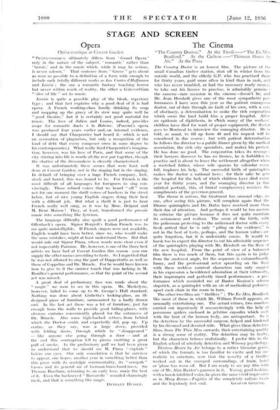Opera .
STAGE AND SCREEN
OpCra-comique at Covent Garden
" OPERA-COMIQUE ultimately differs from ' Grand Opera' only in the nature of the subject, ' romantic' rather than ' heroic,' and in the music which, while it may be serious,
is never solemn." That sentence from " Grove " gets about as near as possible to a definition of a form wide enough to include such totally different works as Les Conies &Hoffmann and Louise ; the one a romantic fantasy touching horror but never within reach of reality, the other a Galsworthian " slice of life " set to music.
Louise is quite a possible play of the bleak, repertory type ; and that fact explains why a good deal of it is bad opera. A French working-class family drinking its soup and mopping up the gravy of its stew may quite well be " good theatre," but it is certainly not good material for music. The love of Julien and Louise, indeed, provides scope for romantic duets a la Boheme. (Puccini's opera was produced four years earlier and, on internal evidence, I should say that Charpentier had heard it—which is not an accusation of plagiarism, but only a recognition of the kind of debt that every composer owes in some degree to his contemporaries.) What really fired Charpcntier's imagina- tion, however, was his love of Paris, and that scene of the city stirring into life is worth all the rest put together, though the chatter of the dressmakers is cleverly characterised.
It was unfortunately these scenes that were least well done at Covent Garden, not in the staging but in the singing. In default of bringing over a huge French company, lock, stuck and barrel, this was bound to be. For French is the most difficult of all languages for foreigners to sing con- vincingly. Those refined voices that we heard " off " were not for one moment the shrill voices of hawkers in the street below, but of nice young English singers doing their best with a difficult job. But what a thrill it is just to hear French really well sung, as it was by Mine. Delprat and M. Ilene Maison They, at least, transformed the prosaic music into something like lyricism.
The language difficulty also spoilt a good performance of Offenbach's opera. Signor Borgioli's Italian French was to me quite unintelligible. If French singers were not available, English would have been better, since we, who would make the same mistakes, might at least understand them. But that would rule out Signor Pinza, whose words were clear even if not impeccably Parisian. He, however, is one of the three best artists we have had at Covent Garden this season--you can supply the other names according to taste. So I regretted that he was not allowed to sing the part of Dappertutto as well as those of Coppelius and Dr. Miracle. For he would have known how to give to it the sinister touch that was lacking in M. Bouillez's general performance, so that the point of the second act was missed.
A great deal of preliminary fuss was made about the " magic " we were to see in this opera. Mr. Maskelyne, however, failed to come up to St. George's Hall standard. Nothing was done about Giolietta's looking-glass, an ill- designed piece of furniture, surmounted by a badly drawn owl. In the last act there was a lot of furniture, just far enough from the walls to provide good hiding-places, with obvious curtains conveniently placed for the entrances of Dr. Miracle. Also sonic high-backed settees, front behind which the Doctor could, and expectedly did, pop tip. Up centre, as they say, was a large stove, provided with folding doors, through which he " disappeared " — like anyone else going through a door — and at the end this contraption fell to pieces emitting a great puff of smoke. In the preliminary puff we had been given to understand that we should see M. Pinza " explode " before our eyes. Our only consolation is that he survives to appear, one hopes, another year in something better than this piece with its nostalgic sentimentality, its " oompah " basses and its general air of German-brass-band-iness. Sir Thomas Beecham, returning to an early love, made the best of it. Even the hackneyed " Barcarolle " sounded charmingly fresh, and that is something like magic.
DYNELF.Y HUSSEY.






















































 Previous page
Previous page